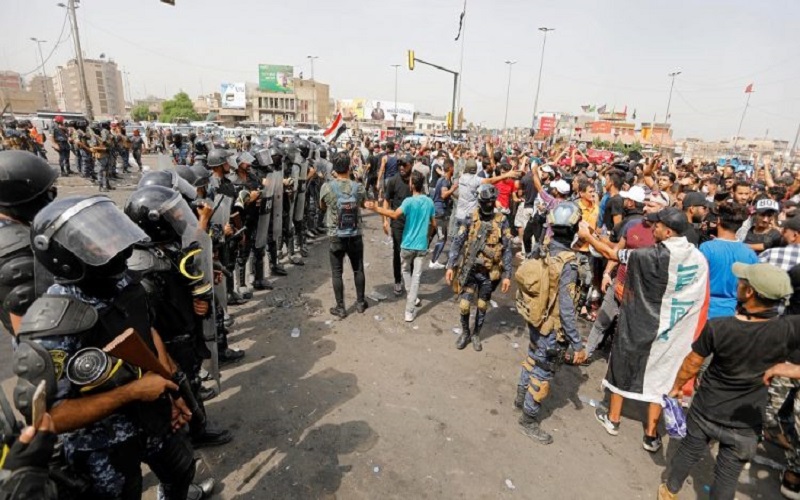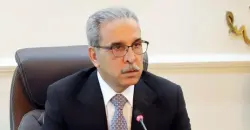From invasion to failed state Iraq’s democratic disillusionment

Shafaq News/ Iraq in 2021 is still a state afflicted by poverty, injustice, the trauma of great loss of life, and daily fear. Iraqis still suffer from a sense of powerlessness, defeat and humiliation. Since the start of the year, 330 civilians have been killed, including 27 children. Iraq Body Count has now documented more than 208,800 violent civilian deaths since the US-led invasion of Iraq in 2003, most of them occurring after the country became a democracy in 2005.
Democratically elected governments in Iraq, supported by the US-UK coalition that invaded and occupied Iraq in March 2003, as part of the ‘War on Terror’, have so far killed more than 4,000 Iraqi civilians through bombing and shelling aimed to destroy the insurgency and in the last years the Iraqi police force and militias it supports have killed hundreds of protesters across Iraq. The Iraqi governments also allowed the killing of thousands more in airstrikes by Coalition and Turkish forces or Iranian-supported militias such as the Popular Mobilisation Forces.
Iraq held its first parliamentary elections in December 2005, while the country was still under US and British occupation. It was meant to hold its fifth elections a month ago, in June, but they have been delayed until mid-October, because the country's Independent High Electoral Commission asked for more time to organise "free and fair elections". Yet, from their very start, Iraq’s elections have been marred by violence, fraud and protests.
On 22 December 2005, after preliminary election results were announced, Sunni and Shiite factions demanded that an international body review complaints of election fraud, and threatened to boycott the new legislature. Large demonstrations broke out across the country.
Protesters said that the elections were rigged in favour of the main religious Shiite coalition. As many as 20,000 people demonstrated in Baghdad and more than 2,000 people demonstrated in Mosul, accusing Iran of involvement in the election. The results were followed by car bombings and attacks on US and Iraqi officials.
Four prime ministers have come to power in Iraq since then, and three heads of state. None of them, however, has managed to satisfy the rightful demands of the Iraqi people: to end corruption, to increase living standards, to create jobs and opportunities for an increasing number of young and educated people, and to provide security.
No country for democracy
Iraq’s devastation was not unpredictable. The neoliberal democratic system that was imposed on the country by the US and its allies could never have produced a Western-style democracy, or the outcomes expected in a developed nation. Highly developed nations such as the UK and the US face no real threat of major war, and enjoy economic prosperity and enduring political and social stability.
Iraq, on the other hand, was – and still is – a weak state. Between 2003 and 2020, the only constants have been communal violence, terrorism, poverty, weapons proliferation, crime, political instability, social breakdown, riots, disorder and economic failure. In Iraq, we observe the lack of basic security that exists in ‘zones of instability’.
As in all weak states, the security threats facing the Iraqi population originate primarily from internal, domestic sources. In such states, the more the ruling elites try to establish effective state rule, the more they provoke insurgency. Despite it being declared a democracy, Iraq lacks security.
As in other so-called ‘liberated and democratised’ states, such as Afghanistan or Libya, those internal/domestic security threats have gone hand in hand with the threat posed by external actors and the neoliberal destruction they brought to the country.
End of which history?
On 31 May, during his Memorial Day speech, US President Joe Biden spoke about his country’s “imperfect” democracy, calling for more work to deliver the promise of “the greatest experiment” in world history. "Democracy is more than a form of government, it's a way of being, a way of seeing the world. Democracy means the rule of the people," Biden said. "The struggle for democracy is taking place around the world."
The collapse of the Soviet Union 30 years ago signalled the end of the Cold War, the defeat of totalitarianism and the success of the liberal democratic order. It led to the infamous “end of history” argument expounded by American political scientist Francis Fukuyama. The USSR’s demise was a triumph for the West, a victory for liberal capitalist democracies and marked the total exhaustion of any viable alternative systems.
Democracy was declared the best form of governance, arising from 20th-century liberalism, the concept of universal human rights and people-focused security, where the state’s democratic institutions are there to protect the rights and freedoms of its citizens. Fukuyama called it “the end point of mankind's ideological evolution and the universalization of Western liberal democracy as the final form of human government”.
In the 21st century, we saw the creation of new democracies through war – in Afghanistan and Iraq, following the 2001 and 2003 invasions, respectively – or through a series of popular revolts – the so-called Arab Spring, which began in 2011. Dictators and authoritarian regimes were removed and parliamentary democracies established.
However, far from reaching “the end of history”, the pursuit of neoliberal transformation by successive Iraqi governments has produced a dystopian economy and a failed state.
Protesters carrying the Iraqi flag are demanding their homeland, as their government violates and abuses their human rights and fails to provide opportunities, or social, health and educational safeguards for the nation’s children.
As security forces and anti-riot police open fire on Iraqis using live ammunition and tear gas, the people continue to demonstrate. It was thought that an Iraq free of its dictator would become a strong state, a democratic, liberal state – much like those in the so-called ‘developed world’. But Iraq has become weaker and less secure. Liberal democracy is not so easily achieved, either through war or through revolutionary transformation. The upcoming elections are unlikely to make any difference, as Iraq’s security situation makes political participation difficult, legitimacy questionable and, due to lack of accountability, any sense of fairness next to impossible.
As for the “end of history”, it was, after all, a somewhat Eurocentric concept.
Source: Open Democracy





